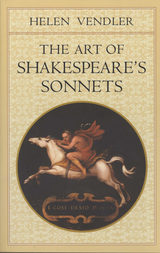
Helen Vendler, widely regarded as our most accomplished interpreter of poetry, here serves as an incomparable guide to some of the best-loved poems in the English language.
In detailed commentaries on Shakespeare’s 154 sonnets, Vendler reveals previously unperceived imaginative and stylistic features of the poems, pointing out not only new levels of import in particular lines, but also the ways in which the four parts of each sonnet work together to enact emotion and create dynamic effect. The commentaries—presented alongside the original and modernized texts—offer fresh perspectives on the individual poems, and, taken together, provide a full picture of Shakespeare’s techniques as a working poet. With the help of Vendler’s acute eye, we gain an appreciation of “Shakespeare’s elated variety of invention, his ironic capacity, his astonishing refinement of technique, and, above all, the reach of his skeptical imaginative intent.”
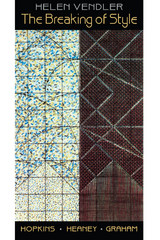
Style is the material body of lyric poetry, Helen Vendler suggests. To cast off an earlier style is to do an act of violence to the self. Why might a poet do this, adopting a sharply different form? In this exploration of three kinds of break in poetic style, Vendler clarifies the essential connection between style and substance in poetry. Opening fresh perspectives on the work of three very different poets, her masterful study of changes in style yields a new view of the interplay of moral, emotional, and intellectual forces in a poet’s work.
Gerard Manley Hopkins’ invention of sprung rhythm marks a dramatic break with his early style. Rhythm, Vendler shows us, is at the heart of Hopkins’ aesthetic, and sprung rhythm is his symbol for danger, difference, and the shock of the beautiful. In Seamus Heaney’s work, she identifies clear shifts in grammatical “atmosphere” from one poem to the next—from “nounness” to the “betweenness” of an adverbial style—shifts whose moral and political implications come under scrutiny here. And finally Vendler looks at Jorie Graham’s departure from short lines to numbered lines to squared long lines of sentences, marking a move from deliberation to cinematic “freeze-framing to coverage, each with its own meaning in this poet’s career.
Throughout, Vendler reminds us that what distinguishes successful poetry is a mastery of language at all levels—including the rhythmic, the grammatical, and the graphic. A fine study of three poets and a superb exposition of the craft of poetry, The Breaking of Style revives our lapsed sense of what style means.
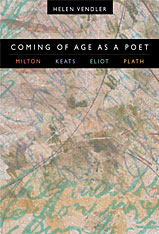
To find a personal style is, for a writer, to become adult; and to write one’s first “perfect” poem—a poem that wholly and successfully embodies that style—is to come of age as a poet. By looking at the precedents, circumstances, and artistry of the first perfect poems composed by John Milton, John Keats, T. S. Eliot, and Sylvia Plath, Coming of Age as a Poet offers rare insight into this mysterious process, and into the indispensable period of learning and experimentation that precedes such poetic achievement.
Milton’s L’Allegro, Keats’s On First Looking into Chapman’s Homer, Eliot’s The Love Song of J. Alfred Prufrock, and Plath’s The Colossus are the poems that Helen Vendler considers, exploring each as an accession to poetic confidence, mastery, and maturity. In meticulous and sympathetic readings of the poems, and with reference to earlier youthful compositions, she delineates the context and the terms of each poet’s self-discovery—and illuminates the private, intense, and ultimately heroic effort and endurance that precede the creation of any memorable poem.
With characteristic precision, authority, and grace, Vendler helps us to appreciate anew the conception and the practice of poetry, and to observe at first hand the living organism that breathes through the words of a great poem.
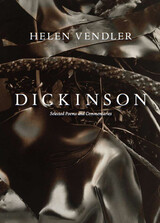
Seamus Heaney, Denis Donoghue, William Pritchard, Marilyn Butler, Harold Bloom, and many others have praised Helen Vendler as one of the most attentive readers of poetry. Here, Vendler turns her illuminating skills as a critic to 150 selected poems of Emily Dickinson. As she did in The Art of Shakespeare’s Sonnets, she serves as an incomparable guide, considering both stylistic and imaginative features of the poems.
In selecting these poems for commentary Vendler chooses to exhibit many aspects of Dickinson’s work as a poet, “from her first-person poems to the poems of grand abstraction, from her ecstatic verses to her unparalleled depictions of emotional numbness, from her comic anecdotes to her painful poems of aftermath.” Included here are many expected favorites as well as more complex and less often anthologized poems. Taken together, Vendler’s selection reveals Emily Dickinson’s development as a poet, her astonishing range, and her revelation of what Wordsworth called “the history and science of feeling.”
In accompanying commentaries Vendler offers a deeper acquaintance with Dickinson the writer, “the inventive conceiver and linguistic shaper of her perennial themes.” All of Dickinson’s preoccupations—death, religion, love, the natural world, the nature of thought—are explored here in detail, but Vendler always takes care to emphasize the poet’s startling imagination and the ingenuity of her linguistic invention. Whether exploring less familiar poems or favorites we thought we knew, Vendler reveals Dickinson as “a master” of a revolutionary verse-language of immediacy and power. Dickinson: Selected Poems and Commentaries will be an indispensable reference work for students of Dickinson and readers of lyric poetry.

Join Professor Helen Vendler in her course lecture on the Yeats poem "Among School Children". View her insightful and passionate analysis along with a condensed reading and student comments on the course.
How does a poet repeatedly make art over a lifetime out of an arbitrary assignment of fate? By asking this question of the work of four American poets--two men of the postwar generation, two young women writing today--Helen Vendler suggests a fruitful way of looking at a poet's career and a new way of understanding poetic strategies as both mastery of forms and forms of mastery.
Fate hands every poet certain unavoidable "givens." Of the poets Vendler studies, Robert Lowell sprang from a family famous in American and especially New England history; John Berryman found himself an alcoholic manic-depressive; Rita Dove was born black; Jorie Graham grew up trilingual, with three words for every object. In Vendler's readings, we see how these poets return again and again to the problems set out by their givens, and how each invents complex ways, both thematic and formal, of making poetry out of fate.
Compelling for its insights into the work of four notable poets, this book by a leading critic of poetry is also invaluable for what it has to tell us about the poetic process--about how art copes with the obdurate givens of life, and about the conflict in art between the whim of fate and the artist's will to choose.

Join Professor Helen Vendler in her course lecture on the Yeats poem "Among School Children". View her insightful and passionate analysis along with a condensed reading and student comments on the course.
The poetry collected in this volume reveals the range and power of the contemporary American imagination. The verve, freedom, and boldness of American English are combined with the new harmonies of modern cadence. Here are distillations of twentieth-century perception, feeling, and thought, and reflections of changing social realities, scientific and psychoanalytic insights, and the strong voices of feminism and black consciousness. This is a book for those who value fresh and original poetry and for readers worldwide who are curious about contemporary American experience.
Helen Vendler relies on her own taste and judgment in singling out excellent poems, beginning with the late modernist flowering of Wallace Stevens and continuing to the present. Her wide-ranging Introduction places recent American poetry in its aesthetic and social contexts. The anthology provides an extensive offering of the work of major poets and introduces many writers who are only now beginning to make their reputation. Thirty-five poets are included, with a representative selection from the earlier to later work of each and a significant number of long poems. Brief biographies of the poets are appended.

This book explores diverse but complementary interdisciplinary approaches to the poetics, intertexts, and influence of the work of C. P. Cavafy (Konstantinos Kavafis), one of the most important twentieth-century European poets. Written by leading international scholars in a number of disciplines (critical theory, gender studies, comparative literature, English studies, Greek studies, anthropology, classics), the essays of this volume situate Cavafy’s poetry within the broader contexts of modernism and aestheticism and investigate its complex and innovative responses to European literary traditions (from Greek antiquity to modernity) as well as its multifaceted impact on major figures of world literature—from North America to South Africa.
Contributors include Eve Sedgwick, Helen Vendler, Dimitrios Yatromanolakis, Richard Dellamora, Mark Doty, James Faubion, Diana Haas, John Chioles, Albert Henrichs, Kathleen Coleman, Michael Paschalis, Peter Jeffreys, and Panagiotis Roilos.

After more than a century of study, we know more about John Keats than we do about most writers of the past, but we still cannot fully grasp the magical processes by which he created some of the most celebrated poems in all of English literature. This volume, containing 140 photographs of Keats’s own manuscripts, offers the most concrete evidence we have of the way in which his thoughts and feelings were transmuted into art.
The rough first drafts in particular are full of information about what occurred, if not in Keats’s mind, at least on paper when he had pen in hand: the headlong rush of ideas coming so fast that he had no time to punctuate or even form the letters of his words; the stumbling places where he had to begin again several times before the words resumed their flow; the efforts to integrate story, character, and theme with the formal requirements of rhyme and meter. Each revision teaches the inquiring reader something about Keats’s poetic practice.
Several of the manuscripts are unique authoritative sources, while others constitute our best texts among multiple existing versions. They reveal much about the maturation of the poet’s creativity during four years of his brief life, between “On Receiving a Curious Shell” (1815) and “To Autumn” (1819). Above all, they show us what is lost when penmanship yields to the printed page: what Helen Vendler, in her insightful essay on the manuscripts, calls “the living hand of Keats.” These sharply reproduced facsimiles provide compelling visual evidence of a mortal author in the act of composing immortal works.
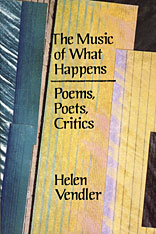
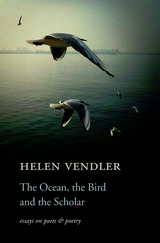
A Times Higher Education Book of the Week
One of our foremost commentators on poetry examines the work of a broad range of nineteenth- and twentieth-century English, Irish, and American poets. The Ocean, the Bird, and the Scholar gathers two decades’ worth of Helen Vendler’s essays, book reviews, and occasional prose—including the 2004 Jefferson Lecture—in a single volume.
“It’s one of [Vendler’s] finest books, an impressive summation of a long, distinguished career in which she revisits many of the poets she has venerated over a lifetime and written about previously. Reading it, one can feel her happiness in doing what she loves best. There is scarcely a page in the book where there isn’t a fresh insight about a poet or poetry.”
—Charles Simic, New York Review of Books
“Vendler has done perhaps more than any other living critic to shape—I might almost say ‘create’—our understanding of poetry in English.”
—Joel Brouwer, New York Times Book Review
“Poems are artifacts and [Vendler] shows us, often thrillingly, how those poems she considers the best specimens are made…A reader feels that she has thoroughly absorbed her subjects and conveys her understanding with candor, clarity, wit.”
—John Greening, Times Literary Supplement

Helen Vendler widens her exploration of lyric poetry with a new assessment of the six great odes of John Keats and in the process gives us, implicitly, a reading of Keats’s whole career. She proposes that these poems, usually read separately, are imperfectly seen unless seen together—that they form a sequence in which Keats pursued a strict and profound inquiry into questions of language, philosophy, and aesthetics.
Vendler describes a Keats far more intellectually intent on creating an aesthetic, and on investigating poetic means, than we have yet seen, a Keats inquiring into the proper objects of worship for man, the process of soul making, the female Muse, the function of aesthetic reverie, and the ontological nature of the work of art. We see him questioning the admissibility of ancient mythology in a post Enlightenment art, the hierarchy of the arts, the role of the passions in art, and the rival claims of abstraction and representation. In formal terms, he investigates in the odes the appropriateness of various lyric structures. And in debating the value to poetry of the languages of personification, mythology, philosophical discourse, and trompe l’oeil description, Keats more and more clearly distinguishes the social role of lyric from those of painting, philosophy, or myth.
Like Vendler’s previous work on Yeats, Stevens, and Herbert, this finely conceived volume suggests that lyric poetry is best understood when many forms of inquiry—thematic, linguistic, historical, psychological, and structural—are brought to bear on it at once.
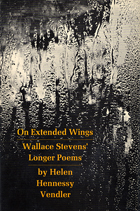
Though Wallace Stevens’ shorter poems are perhaps his best known, his longer poems, Helen Vendler suggests in this book, deserve equal fame and equal consideration. Stevens’ central theme—the worth of the imagination—remained with him all his life, and Mrs. Vendler therefore proposes that his development as a poet can best be seen, not in description—which must be repetitive—of the abstract bases of his work, but rather in a view of his changing styles.
The author presents here a chronological account of fourteen longer poems that span a thirty-year period, showing, through Stevens’ experiments in genre, diction, syntax, voice, imagery, and meter, the inventive variety of Stevens’s work in long forms, and providing at the same time a coherent reading of these difficult poems. She concludes, “Stevens was engaged in constant experimentation all his life in an attempt to find the appropriate vehicle for his expansive consciousness; he found it in his later long poems, which surpass in value the rest of his work.”
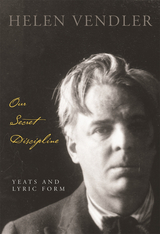
The fundamental difference between rhetoric and poetry, according to Yeats, is that rhetoric is the expression of one’s quarrels with others while poetry is the expression (and sometimes the resolution) of one’s quarrel with oneself. This is where Helen Vendler’s Our Secret Discipline begins. Through exquisite attention to outer and inner forms, Vendler explores the most inventive reaches of the poet’s mind. This book is a space-clearing gesture, an attempt to write about lyric forms in Yeats in unprecedented and comprehensive ways. The secret discipline of the poet is his vigilant attention to forms—whether generic, structural, or metrical. Yeats explores the potential of such forms to give shape and local habitation to volatile thoughts and feelings.
Helen Vendler remains focused on questions of singular importance: Why did Yeats cast his poems into the widely differing forms they ultimately took? Can we understand Yeats’s poetry better if we pay attention to inner and outer lyric form? Chapters of the book take up many Yeatsian ventures, such as the sonnet, the lyric sequence, paired poems, blank verse, and others. With elegance and precision, Vendler offers brilliant insights into the creative process and speculates on Yeats’s aims as he writes and rewrites some of the most famous poems in modern literature.
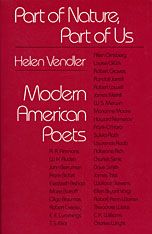

The transparent beauty and effortless grace of George Herbert's poetry have made it seem almost devoid of art. In this comprehensive reading of Herbert, Helen Vendler reveals the complexity inherent in the apparent simplicity of his lyrics. Herbert appears here, both in introspective and in devotional verse, as a poet of universal feeling whose work can be given a human interpretation independent of any religious conviction.
Very nearly all of Herbert's poems are treated in this finely written, forcefully argued study. By looking at the poet's less successful attempts as well as at his best work, Vendler is able to trace his surest line of development in the various modes and forms in which he worked. Comparisons with the work of his adapters and imitators make apparent the perfection and finish of his lines, their interior intellectual and psychological harmony.
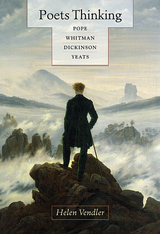
Poetry has often been considered an irrational genre, more expressive than logical, more meditative than given to coherent argument. And yet, in each of the four very different poets she considers here, Helen Vendler reveals a style of thinking in operation; although they may prefer different means, she argues, all poets of any value are thinkers.
The four poets taken up in this volume—Alexander Pope, Walt Whitman, Emily Dickinson, and William Butler Yeats—come from three centuries and three nations, and their styles of thinking are characteristically idiosyncratic. Vendler shows us Pope performing as a satiric miniaturizer, remaking in verse the form of the essay, Whitman writing as a poet of repetitive insistence for whom thinking must be followed by rethinking, Dickinson experimenting with plot to characterize life’s unfolding, and Yeats thinking in images, using montage in lieu of argument.
With customary lucidity and spirit, Vendler traces through these poets’ lines to find evidence of thought in lyric, the silent stylistic measures representing changes of mind, the condensed power of poetic thinking. Her work argues against the reduction of poetry to its (frequently well-worn) themes and demonstrates, instead, that there is always in admirable poetry a strenuous process of thinking, evident in an evolving style—however ancient the theme—that is powerful and original.

Poet and critic are well met, as one of our best writers on poetry takes up one of the world’s great poets.
Where other books on the Nobel laureate Seamus Heaney have dwelt chiefly on the biographical, geographical, and political aspects of his writing, this book looks squarely and deeply at Heaney’s poetry as art. A reading of the poet’s development over the past thirty years, Seamus Heaney tells a story of poetic inventiveness, of ongoing experimentation in form and expression. It is an inspired and nuanced portrait of an Irish poet of public as well as private life, whose work has given voice to his troubled times.
With characteristic discernment and eloquence, Helen Vendler traces Heaney’s invention as it evolves from his beginnings in Death of a Naturalist (1966) through his most recent volume, The Spirit Level (1996). In sections entitled “Second Thoughts,” she considers an often neglected but crucial part of Heaney’s evolving talent: self-revision. Here we see how later poems return to the themes or genres of the earlier volumes, and reconceive them in light of the poet’s later attitudes or techniques. Vendler surveys all of Heaney’s efforts in the classical forms—genre scene, elegy, sonnet, parable, confessional poem, poem of perception—and brings to light his aesthetic and moral attitudes.
Seamus Heaney’s development as a poet is inextricably connected to the violent struggle that has racked Northern Ireland. Vendler shows how, from one volume to the next, Heaney has maintained vigilant attention toward finding a language for his time—“symbols adequate for our predicament,” as he has said. The worldwide response to those discovered symbols suggests that their relevance extends far beyond this moment.
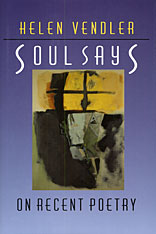
Join Professor Helen Vendler in her course lecture on the Yeats poem "Among School Children". View her insightful and passionate analysis along with a condensed reading and student comments on the course.
To know the poetry of our time, to look through its lenses and filters, is to see our lives illuminated. In these eloquent essays on recent American, British, and Irish poetry, Helen Vendler shows us contemporary life and culture captured in lyric form by some of our most celebrated poets. An incomparable reader of poetry, Vendler explains its power; it is, she says, the voice of the soul rather than the socially marked self speaking directly to us through the stylization of verse. "Soul Says," the title of a poem by Jorie Graham, is thus the name of this collection. In essays on Seamus Heaney, Donald Davie, Allen Ginsberg, John Ashbery, Rita Dove, Jorie Graham, and others, Vendler makes difficult poetry accessible. She reveals the idiosyncratic nature of lyric form, and points out the artistic choices present in even the simplest texts. Vendler examines the use of abstraction in lyric poems; considers what readers seek and receive from verse; describes the role of such stylistic devices as compression, structural dynamics, and syntactic ordering; and renders a wide variety of poetic styles meaningful. Through her perceptive eyes we see how lyric poetry, speaking with natural musicality and rhythm, can by arrangement, pacing, metaphor, and tone create symbol from fact-and fill us with new understanding. In these direct and engaged commentaries, she explores the force, beauty, and intellectual complexity of contemporary lyric verse.


READERS
Browse our collection.
PUBLISHERS
See BiblioVault's publisher services.
STUDENT SERVICES
Files for college accessibility offices.
UChicago Accessibility Resources
home | accessibility | search | about | contact us
BiblioVault ® 2001 - 2024
The University of Chicago Press









